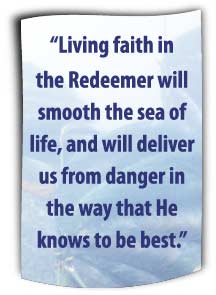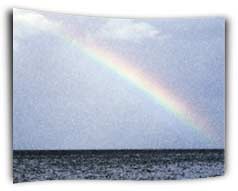
 ERE IN THE SEASHORE VILLAGE OF Capernaum was the temporary home of Christ, who for most of his life was homeless. Ah, what scenes of kindness and power, of glory and pathos, when our Lord lived here! What a solemnity and what a rapture to be here!
ERE IN THE SEASHORE VILLAGE OF Capernaum was the temporary home of Christ, who for most of his life was homeless. Ah, what scenes of kindness and power, of glory and pathos, when our Lord lived here! What a solemnity and what a rapture to be here!
Sitting on the banks of this lake where I stand, Robert McCheyne wrote:
?It is not that the wild gazelle
Come down to drink thy tide,
But He that was pierced to save from hell,
Oft wandered by thy side.
Graceful around thee the mountains meet,
Thou calm reposing sea;
But ah! far more, the beautiful feet
Of Jesus walked o?er thee.?
I can now easily understand from the contour of the country that bounds this lake that storms were easily tempted to make these waters their playground. From the gentle way this lake treated our boat when we sailed on it, one would have thought it incapable of a paroxysm of rage, but it was quite different on the occasion when Jesus said to the disciples: ?Let us cross over to the other side of the lake.?1
I close my eyes, and there comes back to my vision that eventful day. It lies in a scene of great luxuriance; the surrounding hills, terraced, sloped, grooved, so many hanging gardens of beauty. On the shore are castles, armed towers, Roman baths, everything attractive and beautiful; all styles of vegetation from the palm tree of the forest to the trees of rigorous climate. Roman gentlemen in pleasure boats sailing this lake, and countrymen in fish smacks coming down to drop their nets, pass each other with a nod and a shout and laughter, or swing idly at their moorings. Oh, what a beautiful scene!
 It seems as if we shall have a quiet night. Not a leaf winks in the air; not a ripple disturbs the face of Gennesaret; but there seems to be a little excitement up the beach. We hasten to see what it is. An embarkation.
It seems as if we shall have a quiet night. Not a leaf winks in the air; not a ripple disturbs the face of Gennesaret; but there seems to be a little excitement up the beach. We hasten to see what it is. An embarkation.
From the western shore a flotilla is pushing out. Jesus, weary with much speaking to large multitudes, leaves the crowd, and the disciples take Him with them in the boat where He had been sitting. Other boats accompany them.2 The rocking of the waves quickly puts Jesus into somnolence. No sooner does Christ?s head touch the pillow
(perhaps made out of a fisherman?s coat), than He falls sound asleep. The breezes of the lake run their fingers through the locks of the worn sleeper, and the boat rises and falls like a sleeping child on the bosom of a sleeping mother.
Calm night, starry night, beautiful night. Run up all the sails, ply all the oars, glide over gentle Gennesaret. But, a sudden change. The disciples hear the first moans of a storm. It comes in great strides with all the terrors of hurricane and darkness.
The boat trembles; great patches of foam are flung into the air; the sails of the vessel loosen, and the sharp winds crack like pistols; the boat pitches like seabirds poised on cliffs of the waves and then plunges. ?The billows talk with death.?3 Drenched, the disciples rush into the stern and lay hold on Christ. ?Master, we are sinking!? they say to Him. ?Do you not care??4
That great personage lifts His head from the pillow, walks to the bow of the vessel, and looks out into the storm. By the flash of the lightning I see the calm brow of Christ as the spray drops from His beard. He has one word for the sky and another for the waves. Looking upward He cries: ?Peace!? Looking downward, he says: ?Be still!?
The waves fall flat on their faces, the foam melts, the extinguished stars relight their torches. The tempest falls dead. And Christ stands with His feet on the neck of the storm.
The disciples ?were awestruck and said to one another, ?Who can this be? Even the wind and the sea obey.??5
Sitting under the shade of a giant eucalyptus tree overlooking the now tranquil waters of the lake, I ponder the meaning this ancient story has for us.
 The first and perhaps most obvious lesson that emerges is that we must always have Christ in the ship. Whatever voyage we undertake, whatever enterprise we start, let us always have Christ in the ship. Though there may be in it arctic blasts or tropical tornadoes, ?whether on the land or on the sea, if we have the Savior in our hearts, there is no need of fear. Living faith in the Redeemer will smooth the sea of life, and will deliver us from danger in the way that He knows to be best.?6
The first and perhaps most obvious lesson that emerges is that we must always have Christ in the ship. Whatever voyage we undertake, whatever enterprise we start, let us always have Christ in the ship. Though there may be in it arctic blasts or tropical tornadoes, ?whether on the land or on the sea, if we have the Savior in our hearts, there is no need of fear. Living faith in the Redeemer will smooth the sea of life, and will deliver us from danger in the way that He knows to be best.?6
Second, following Christ is not smooth sailing. That?s what the disciples discovered that night. And in the following years James would lose his head. Philip would be hanged to death on a pillar. Matthew had his life dashed out with a halberd. Mark was dragged to death through the streets. James the Less was beaten to death with a fuller?s club. Thomas was struck through with a spear. Huss, Tyndale, the Albigenses and Waldenses, the Scottish Covenanters--we are familiar with their tempestuous trials.
We do not have to retreat into history, however. We can draw from our own memory illustrations of this truth. But take courage. ?These are the ones who come out of the great tribu-lation?7--great flailing, as the original has it. We are in glorious companionship.
Third, this story reminds me that Jesus was both God and man. In the stern of the vessel, tired, He?d fallen asleep. He was human. But at the prow of the boat I see the storm kneeling at His feet, the tempests folding their wings in His presence--He was God!
In our sorrow, loss, and trouble--wanting sympathy--we may kneel down in the stern of the boat before the God-man and say: ?Weary one of Gennesaret, carry the burden that is too hard for us to bear.? And when we want to conquer our spiritual foes, we may come to the bow of the vessel and hear the divine assurance that we can be ?more than conquerors.?8
Fourth, I can leave my sheltered spot with the assurance that Christ can hush the tempest. For the disciples, ?helpless in the grasp of the tempest? when ?hope failed them,? and when ?their strength and skill availed nothing,?9 it did seem as if everything must go to ruin. Yet Christ arose, put His foot on the storm, and saw it crouch at His feet. In the same way, Christ can hush the tempest of our lives. You have troubles? A little child taken from you--the one who asked the most curious questions and stood around you with the greatest fondness? The loss cuts down deep into your bleeding heart. Perhaps it was an only son, and your heart has ever since been like a desolated castle, the owls of the night hooting among the fallen arches and crumbling stairways. Perhaps it was an aged mother. You always went to her in your troubles, but her elderly hands will do you no more kindness. Or with the decline of stock values and government securities, your assets are gone; or a category 5 hurricane has left you with nothing but an empty suitcase.
 Yet you have not been entirely overthrown. Why? Because Christ ?never fails to give us the help we need.?10 He says, ?I have that little one in my keeping and angels guard the place where your son and mother rest awaiting eternal reunion in a land where no one will ever say goodbye. And, there are treasures in heaven, in banks that never break,? and ?I am going to bring on [you] all the good that I am promising [you].?11
Yet you have not been entirely overthrown. Why? Because Christ ?never fails to give us the help we need.?10 He says, ?I have that little one in my keeping and angels guard the place where your son and mother rest awaiting eternal reunion in a land where no one will ever say goodbye. And, there are treasures in heaven, in banks that never break,? and ?I am going to bring on [you] all the good that I am promising [you].?11
Jesus hushed the tempest! ?He will . . . have compassion on us.?12 By the flash of the storm you see the harbor ahead, where all dangers are over and we stand secure on the glorious shore, home at last.
We?ve come through the storm!
_________________________
1 Mark 4:35, NEB.
2 See verse 36.
3 The Desire of Ages, p. 381.
4 Verse 38, NEB.
5 Verse 41, NEB.
6 The Desire of Ages, p. 336.
7 Rev. 7:14, NKJV.
8 Rom. 8:37, NKJV.
9 The Desire of Ages, p. 334.
10 Ibid., p. 336.
11 Jer. 32:42, NASB.
12 Micah 7:19, NKJV.
_________________________
Rex D. Edwards is the associate vice president and dean of religious studies at Griggs University in Silver Spring, Maryland.
_________________________
Related Story: When Strong Winds Blow